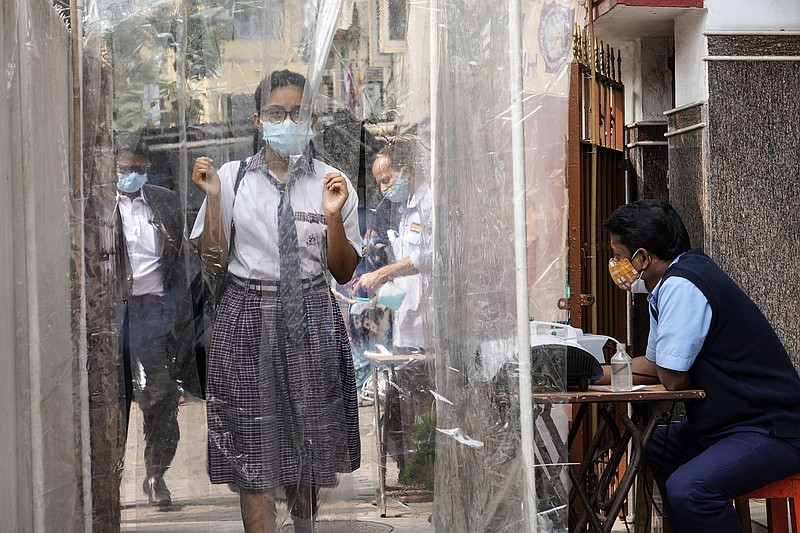SAN JOSE, Costa Rica -- In Costa Rica, officials are encouraging those infected with the coronavirus to skip voting in upcoming national elections. On the other side of the world, Beijing is locking down residential communities as the country anxiously awaits the start of the Winter Olympics on Feb. 4.
In Latin America and Asia, where the omicron variant is making its latest appearance, some countries are imposing such restrictions while others are loath to place new limits on populations already exhausted by constraints.
Omicron quickly swept through the places it hit first, such as South Africa, the U.K. and the United States, pushing daily cases far higher than at any time during the pandemic.
The Americas reported nearly 7.2 million new infections and more than 15,000 deaths over the past week, the Pan American Health Organization said Wednesday. Infections across the Americas almost doubled between Jan. 1 and Jan. 8, from 3.4 million cases to 6.1 million, it said.
Infections are accelerating in Bolivia, Brazil, Colombia and Peru, and hospitalizations are rising in Argentina, Paraguay and Uruguay, said organization Director Carissa Etienne. The Caribbean islands are experiencing their steepest increase in cases since the start of the pandemic, she noted.
"Although omicron infections appear to be milder, we continue to urge caution because the virus is spreading more actively than ever before," Etienne said.
[CORONAVIRUS: Click here for our complete coverage » arkansasonline.com/coronavirus]
Infections are also increasing in Asia, including in the Philippines, which has seen its worst outbreak in recent weeks.
Countries in both regions are searching for a mix of restrictions that their exhausted populations will accept and that won't inflict undue damage on their economies.
"We're already going on three years of the pandemic and the population is tired," said Brazil's president of the Council of State Health Secretariats, Carlos Lula. "There is no space for many restrictions. We're going to have to face a third wave with precautions like masking, distancing and vaccination."
Argentina and Mexico also have largely ruled out any national restrictions, instead banking on their vaccination campaigns and the apparently less severe symptoms of omicron.
Mexican President Andres Manuel Lopez Obrador, having just emerged from a week of isolation after his second coronavirus infection in the past year, downplayed the threat. "It is demonstrable that this variant does not have the same seriousness as the earlier, the delta," he said this week.
Antonio Perez, 67, runs a small stand in a Mexico City market selling notebooks, pens and other school supplies. He was forced to shutter his shop for three months early in the pandemic, rocking him financially. But he agreed with the government's decision then -- a time when little was known about the virus's spread and no one was vaccinated -- and with the hands-off approach now, when most of the population is vaccinated and there is less pressure on hospitals.
Immunization, masks and social distancing are the way to go, he said, speaking through his N95 mask. "I don't think you can do anything else."
Some states in Brazil have reimposed restrictions but stopped short of closing businesses as they did last year. Peru, however, has revived a nationwide curfew, and Ecuador has banned public and private events or large gatherings of any kind.
In Costa Rica, public health concerns are colliding with constitutional guarantees for the Feb. 6 presidential and congressional elections. Authorities concede they can't stop people from voting, but Eugenia Zamora, president of the Supreme Electoral Tribunal, recently told news outlets that those who test positive for coronavirus should abstain from going out to vote.
Demographer Luis Rosero said that according to his projections, the new wave of infections could peak right around election day. Under current health protocols, those who test positive in Costa Rica are obligated to isolate.
Costa Rica's daily confirmed infection totals have risen from fewer than 100 in December to more than 5,000 this month. So far, however, the government has imposed few restrictions, such as requiring soccer clubs to play without fans.
BOOSTERS ENDORSED
Meanwhile, the World Health Organization says vaccine boosters should now be offered to people, starting with the most vulnerable, in a move away from its previous insistence that boosters were unnecessary for healthy adults and an acknowledgment that the vaccine supply is improving globally.
At a briefing Friday, the U.N. health agency said it was now recommending booster doses of the Pfizer-BioNTech vaccine, beginning in the highest-priority groups, about four to six months after the first two doses, in line with guidance from dozens of countries that embarked on booster programs months ago.
Last year, WHO pleaded with rich countries to declare a moratorium on booster doses until the end of 2021, an appeal that was largely ignored.
The agency said its expert vaccine group assessed the increasing data about boosters and noted the waning of immune protection over time. Numerous studies have shown in recent months that booster doses restore antibody levels and offer strong protection against severe disease, including against variants such as delta and omicron.
"Boosters are part of the vaccination program, but it doesn't mean unfettered use to all ages," said WHO's Dr. Kate O'Brien, director of immunization, vaccines and biologicals. "We continue to have highest focus on vaccination of highest-priority groups," she said.
WHO also endorsed the use of the Pfizer-BioNTech vaccine for children as young as 5, at a reduced dose. Countries including the U.S. and Canada gave the green light to Pfizer's shot for young children last fall,
Information for this article was contributed by Javier Cordoba, Christopher Sherman, Debora Alvares, Gonzalo Solano, Almudena Calatrava, Danica Coto, Franklin Briceno, Carlos Valdez, Eva Vergara, Gisela Salomon, Zen Soo, Jim Gomez, Mari Yamaguchi, Tong-hyung Kim and additional staff members of The Associated Press.
